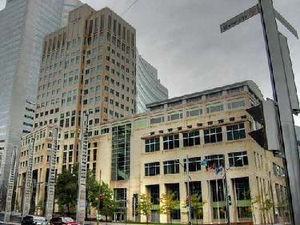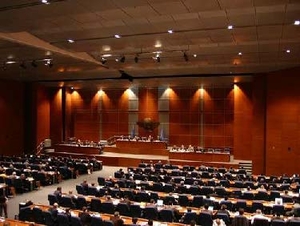Politicians, economists, political scientists and sociologists will be gathering in Montreal on April 14th to examine the flaws in the world’s financial and social policies and at the same time consider why some countries, Canada in particular, have weathered the recent economic meltdown better than others.
The Canadian Model: Strategic lessons for the post-crisis world, is the second of nine global conferrences sponsored by the New School of Athens and is aimed at determining what about globalization works and what doesn’t.
 It is an effort to find solutions to rescue the world’s debt-swamped economies and to redress the income inequality that threatens to wreak havoc in many industrialized countries.The first conference was held last November in Bordeaux, France, and examined the French model. The Montreal conference will be held at the headquarters of the International Civil Aviation Organization. (ICAO), and will examine the strengths and failings of the so-called Canadian model. The seminars will look at how Canada manages its public deficit, why the Canadian banking system is considered one of the world’s best, and the strengths and failings of our National Health Care system.
It is an effort to find solutions to rescue the world’s debt-swamped economies and to redress the income inequality that threatens to wreak havoc in many industrialized countries.The first conference was held last November in Bordeaux, France, and examined the French model. The Montreal conference will be held at the headquarters of the International Civil Aviation Organization. (ICAO), and will examine the strengths and failings of the so-called Canadian model. The seminars will look at how Canada manages its public deficit, why the Canadian banking system is considered one of the world’s best, and the strengths and failings of our National Health Care system.
The conference, popularly called the Montreal Dialogues, will be co-chaired by Quebec’s former finance minister, Monique Jérome Forget and by Thomas d’Aquino, former CEO of the Canadian Council of Chief Executives, and an influential architect of Canadian Public Policy. Participants will include former Prime Ministers Jean Chretien and Paul Martin; Olivier Giscard d'Estaing founder of INSEAD and former member of the French parliament; Mel Cappe, President of the Institute for Research on Public Policy; Quebec's delegate- general to New York John Parisella; MP Marc Garneau; Christiane Bergevin, vice-president of the Mouvement Desjardins; Jean-Francois Lisee, and Don Drummond, chief economist at TD Canada Trust among many others.
 “When you realize how badly the world is now governed, we have to look at the reasons for that and come up with a solutions and reshape our institutions to meet the present and future global challenges.” said Kimon Valaskakis a former Canadian ambassador to the Organization for Economic Co-operation and Development, and founding president of the think tank. “The economic crisis of 2007 was merely the earthquake that preceded the Tsunami. We are now dealing with the aftershocks, and no one has any idea of when they will end or where we want to go, other than the usual clichés.” Valaskakis, who has a Phd. in economics and a French law degree, believes in better world governance.
“When you realize how badly the world is now governed, we have to look at the reasons for that and come up with a solutions and reshape our institutions to meet the present and future global challenges.” said Kimon Valaskakis a former Canadian ambassador to the Organization for Economic Co-operation and Development, and founding president of the think tank. “The economic crisis of 2007 was merely the earthquake that preceded the Tsunami. We are now dealing with the aftershocks, and no one has any idea of when they will end or where we want to go, other than the usual clichés.” Valaskakis, who has a Phd. in economics and a French law degree, believes in better world governance.
“The G-20 is merely an actor on the global stage. It is but one body, a government body. In our conferences we want to bring other actors to the stage -business people, politicians, and academics,” Valaskakis said. “There are already 5,000 initiatives in the world concerned with globalization. It is not our intention to be the 5001, but to collect the best ideas from the initiatives that already exist and mould them into pragmatic action plans.”
After Montreal, similar conferences are planned for Brussels, Washington, and four more in the non-western world, in Asia, Africa and the Middle East. The ideas will be brought to the table at an integrating meeting in Athens planned for 2013.
The Montreal conference is limited to 400. For further information visit NewschoolofAthens.org

























Commentaires
Veuillez vous connecter pour poster des commentaires.